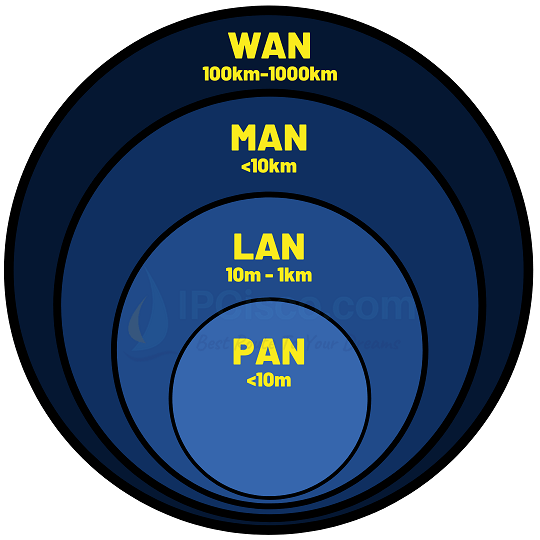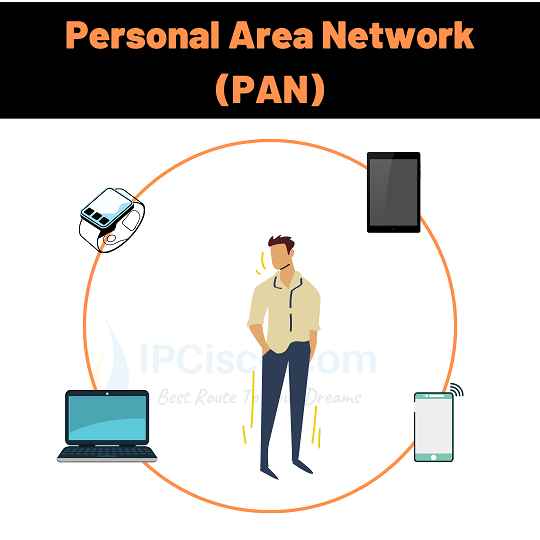- COURSES
- SPECIALS
- BLOG
- MEMBERS
- SHOP
- ABOUT
- ENROLL HERE

A computer network is basically a group of nodes (pcs, switches, routers etc.) connected together to share data. Devices in this system, shares files, programs or any other data each other. There are different types of networks, small, medium or large according to the need. These network types can be used in you home, in your company or between branches, cities, countries.
In this lesson, we will focus on different types of networks. According to their size and used area, we can divide networks into different types. These types are given below:
Now, let’s focus on each of these types of networks one by one.
Test yourself with Network Quizes Page!
Table of Contents
The smallest network type is PAN (Personal Area Network). A PAN is the network around a single person. It consists of smart phones, laptops, tablets, wearable technology or any other personal digital device.

PAN covers a very small area, which is almost maximum 10 meters far from a person. With this characteristic, PAN is limited with distance. But it is very important for today’s connected world.
You can also watch Network Types Video Lesson Below (Members Only)
LAN (Local Area Network) is a small type of network used in houses, companies, schools or any other small areas. These types of networks are used for file sharing, resource sharing, communication in a small area. It is also used to share internet connection in any place. For example, the network in your company which you share information or communicate with your colleagues is a LAN.
LANs covers mainly a building or a site. So, it has a distance limitation. With these characteristics, it is smaller than MAN and WAN. In LANs, both copper and fiber optic cables can be used. LANs are fast networks. There are differen LAN topology types.
LANs are one of the most used network types in today’s world. All of us benefit from different LANs every day. We join home network, company network, library network or any other LAN daily.
MAN (Metropolitan Area Network) is another type of networks which is larger than LAN and smaller than WAN. It covers medium range areas, in other words several miles. With this characteristic, a MAN can cover a campus, a region or even a city.
In MANs, mainly fiber optic cables are used. This is because the covered distance. Fiber optic provides good performance for these types of networks. Wireless technology can be also sued for MANs.
MANs are costly networks and it need experienced network engineers for MAN administration.
WAN (Wide Area Network) is the largest network type used in computer networks. It covers large geographical areas. WANs can also connect other small and medium networks like LANs and MANs.
Building a WAN is very costly. It is also hard to manage a Wide Area Network. It needs expert network engineers for building, maintenance and troubleshooting.
WANs are slower than MANs and LANs. Because it covers a very large geographical area.
Beside the above basic types of networks, there are also other networks used in computer networking. These networks types are given below:
Now, let’s explain these different network types.
WLANs are the wireless LANs, which covers a small area to provide a wireless connection to laptops, smartphones or any network devices. It is used by wireless capable devices and provide a small network in a limited area.
Wireless networks in your homes, in your company or in Starbucks are all WLAN examples.
SAN (Storage Area Network) is used to store data in the networks. It is mainly used with disk arrays, tape libraries etc.
CAN (Campus Area Network) is used mainly within a site which connects different buildings and departments.
VPN (Virtual Private Network) is the private network which uses public internet to connect remote locations. This is mainly used by company networks or as private usage at homes.
VLANs are the virtual LANs used in network switching. With this network type, a switched network can be divided into different broadcast domains. By doing this, it provides security, scalability, efficiency in a switched network.
In this lesson, we have learned different types of networks used in computer networking. You will work each of these networks during your career. By working on these networks practically, you will be more familiar to these network types.
Great….
Thank you Bramhanand :) Good luck!
Well put together
Thank you Abdulraheem:) Good luck!
Great
Thank you Michael:) Good luck!